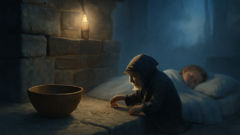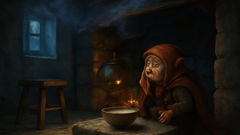Introduction
On the edge of a peat-blackened moor, where gullies drank the rain and the river kept a low, steady conversation with the stones, there stood a house of grey stones and a steep slate roof. Its chimney made a small, reliable plume of smoke on good days and a stubborn, troubled puff on wilder ones. Families came and went across the generations, but there was a quiet, companionable rhythm to that house: wood seasoned and stacked in winter, strips of dried seaweed hung for fence-gaps in spring, a scullery that smelled of oatmeal and soap. Those who had lived in the house for any long stretch knew a dozen small ways the place had of keeping its own counsel. The hearth never quite went out, even when every door was locked; a scrubbed wooden ladle could be found clean and drying when it had been dirty the evening before; someone—no one could say who—always left the ladder propped and the pantry door latched. People called such things providence, thrift, or merely good habit. In the evenings, under oil lamps and the hush of curtains, grandmothers and farmers would lower their voices and call the presence by a kinder name: the Brownie. The Brownie was not a ghost and not quite a fairy. It had no desire for gold, no taste for the feasting of the fairy courts, and it shrank from strangers and loud crowds. It preferred to slip across the thresholds of a single household and set things right: a spilled handful of oats scooped and swept, a thread mended beneath a sleeping child's heel, a kettle stoked to a soft whisper so the next morning's porridge would sing. In exchange the Brownie asked for so little that the request became a kind of test: a small bowl of cream or fresh milk left by the warm hearth as night fell, a bowl not placed as a bargain but offered as thanks. Those who observed the Brownie's ways prospered in modest, steady ways. Those who sought to catch or bribe it learned a sterner lesson. This is the story of one such house, the family that kept the ritual, and the shy household helper whose kindness touched the smallest corners of their lives. It is a story stitched of quiet labor, a child's bold curiosity, a mother's slow understanding, and a Brownie who found, in the human habit of gratitude, the truest shelter.
The House on the Moor and the Family Who Kept It
Ewan McRae came to that house in the spring of a lean year, when the road from the market town was more a suggestion than a path and the cart-ruts held yesterday's rain like a memory of rivers. He married Isla when both thought the world owed them nothing, and that was the precise time weather and fortune turned toward the house as if to test the mettle of its occupants. Ewan was broad-shouldered and patient with animals; Isla had hands quick with bread and gentler with children. They had one child when the first stories began to gather — a daughter named Mairi, all curiosity and dimples — and later, when their work permitted a second mouth, a boy, Hamish, who learned to whistle at dawn. The house was of no consequence to neighbours except for the fact that it kept going. It was not grand; it took pride only in being whole each winter. Yet there were strange comforts to be found there: the butter kept a steady sweetness; the loaves browned more evenly; jars of jam never seemed to ferment overnight as if bewitched. The neighbours called it luck. Mairi's grandmother, who had seen the house through a different century of winters, called the quiet work of the house 'a manner' and told stories with a tone that treated certain small helpers as a matter both of superstition and of common sense. "Leave him his bowl," she would say, tapping the rim of an empty teacup as though she placed its semblance on a ledger. "No clumsy hands to scare him away, mind. He doesn't need coin. He asks us for one bowl, and a good home for the long night." Isla laughed at first: part sceptic, part practical, part fond of anything that made a child's eyes widen. But the bowl was placed as tradition demanded, simply because some habits cost nothing and returned a tidy, daily mercy. The Brownie—if that small, lithe helper could be given the dignity of name—arrived not with trumpets but with the economy of a weathered coin: it mended hems beneath sleeping bodies, straightened the cat's bed, drew a comb through the children's hair while they dreamed, stacked wood in the paling twilight so the first knock at dawn met a ready hearth. Mairi, half convinced such a thing was only a story, watched the house with a scientist’s patience. She would set small traps of imagination, leaving shimmering ribbons to prove faeries, or a tin of sugar along the windowsill to tempt a mischievous spirit. Nothing startled or taunted her tests; only once she found the sugar untouched and the small ribbon curled in a neat, impossible braid at the foot of her mattress. "He likes order," her grandmother said with certainty. "And quiet." Time, which changes even the best-told habits, altered small things. Ewan's hands became more capable of coaxing stubborn soil into submission, Isla's recipe for oat cakes acquired a secret pinch that none could name, and the children's laughter grew fuller. The house kept its welcome all the same; the bowl by the hearth remained as much a part of the evening as the closing of shutters and the counting of beeswax candles. One winter, when frost lay like honest white upon every furrow and the sheep looked as if they'd been powdered by some careful hand, a stranger arrived. He had eyes like the river—grey and fast—and a coat stitched from an angle of sea-spray. He knocked often at first, speaking with the earnestness of a man who believed that everything could be fixed by honesty and work. He accepted hospitality without ceremony. On the third night, when Mairi was ten and had learned to place the cream with a seriousness that suggested ritual rather than duty, the stranger lingered by the hearth as if waiting for a smoke-scented story. He watched the bowl, he watched the child's careful hands, and he watched the space beneath the hearth where, on the way to bed, he could have sworn a shadow sighed. "Do you truly think there's a creature that keeps the house?" he asked, more to the room than to the family. Ewan shrugged and offered him a seat. "We leave a bowl for a thing called a Brownie. It keeps small troubles small, that is all." The stranger smiled like someone who counted such details as if they were rare coins. "I have travelled through glens where doors latch themselves and byres where the milk is sweeter for no sensible reason," he said. "If you keep him kindly, he will keep you kindly in turn." There was kindness in his tone but a note of commerce too—an idea that the Brownie might be traded for stories, or for secrets uncovered, or for proof of the impossible. None in the house wished to exchange their quiet favour for demonstration. The household had learned something important: the Brownie did not thrive under scrutiny. It withered, if not in body, then in the very manner that made it a companion instead of a curiosity. That spring and winter, then, the rituals persisted. The children grew up with an intimacy toward the unseen: they did not set out to catch the Brownie, but they left polite notes now and then—tiny thank-yous tucked into a crack in a cupboard. The Brownie replied in small kindnesses: an extra egg at baking, a found thimble when the mother's was missing, a loaf placed to cool where a mouse had not yet touched it. The family kept their side of the arrangement well. They learned the rhythm of leaving, not as a bargain but as a habit of consideration. So the house on the moor carried on, an ordinary place with an extraordinary set of domestic mercies. It endured storms, disputes, the small griefs of lost sheep and bruised promises, and it kept the bowl on the hearth. In the steadiness of that little bowl were bound stories of a shy spirit who preferred order to adoration and a family who learned how to be generous by learning how little generosity sometimes asked.

An image interrupts the narrative here, capturing a moment of domestic hush: the Brownie beneath the hearth, accepting a bowl of cream left in the dim, flamed glow of the cottage.
The stranger's presence rippled outward like wind through reeds. Neighbours, who'd once called the house lucky with a shrug, began to ask questions, to place wagers over porridge and to speculate how such domestic fortune might be won. That curiosity quickened a kind of want. A merchant from a nearby village suggested that if one household prospered, perhaps someone might entice the Brownie away with flour, with silver, or with elaborate offerings. Some among them could not accept the idea that quiet good sense was enough; they sought rules and leverage. To them, the Brownie was a resource to be directed rather than a neighbour to be respected. Such ideas rarely end without consequence. The Brownie is tolerant of many small human foibles: the odd selfishness here, a child's greedy hand there, a poor bargain from time to time. But it resents being paraded or commanded. For the McRaes, nothing so clumsy occurred. They were proud of the house's modest steadiness and protective of the small rhythms that made it so. Mairi learned, before stepping fully into adulthood, that there are economies of care that no coin can measure. She saw the world in measures of kindness and small repairs—how a mended hem can save a child's courage, how a bowl left on the hearth becomes a lesson in gratitude passed without sermon. When the stranger finally took his leave, he did not take the Brownie with him. He left the bowl where it had always been, and with it he left a subtle proof: sometimes the simplest hospitality is the most binding. People came to visit the house for reasons at once mundane and quiet. They stayed for a day, they left, and they returned changed by an encounter not with wonder but with a small, human humility. That humility held the house through winters and long seasons. It kept the Brownie present—not as a servant enslaved to curiosity, but as a friend trusted in the dim hours when human hands are asleep and only the steady smallness of good work is at play.
Mairi's Curiosity and the Lessons of Quiet Friendship
Mairi was a creature of two instincts: the first belonged to her lineage—an economy of care taught by women who rose at first light to tend milking, spinning, and the unromantic mathematics of household life; the second was an unquiet curiosity that made her watch the way light fell on dust motes and the shape a shadow made at noon. When she was small she would wake before dawn, listen to the creak of the bed-floor and the distant cough of the chimney, and imagine that somewhere between the mortar seams and the thatch there was a life slower than her mind's. That thought became a small pursuit. She placed crumbs for birds in the eaves, and in doing so she learned the patient calendar of wings. She tied notes of thanks and tucked them into drawers, and when she found a thimble restored or a cloth smoothed where hands had left it rumpled, she felt as if a gentle, invisible hand had taken hers and taught her how to sit still. Curiosity, for Mairi, was not an appetite for spectacle but for understanding. She loved to observe the Brownie's small codes: you left no spoon standing in a pan, you set the bowl not directly by the flame but upon a ledge so the creature's feet wouldn't scorch, you never spoke loudly of the favors it rendered. It required restraint. Once, when she was eleven and had not yet learned the discipline of astonishment, she set a bell on a thread by the hearth and resolved to catch the Brownie by sound. The bell sang a bright, foolish note at midnight and awoke Mairi in a high, excited whisper. She crept to the stone and peered beneath. For a beat she saw only a small, quick shadow, and then a figure moved—a rush of russet, a glimpse of hands like knotted roots. Mairi's throat tightened and her breath stilled with a singular, childish desire: to know utterly. She reached for the bell's thread to draw it close and prove the truth of the thing she had glimpsed. But the floorboards, remembering a different care, complained with a long, low groan beneath her foot. The figure, small and swift as a stoat, withdrew like smoke. In the morning the bell lay where she had left it: untouched, the thread snapped clean where no human hand had cut. Mairi learned then that curiosity could wound delicate courtesies. The Brownie did not seek mastery over humans; it sought to live within the home with a dignity that required privacy. When she apologized—to the bowl, to the hearth, to the air itself—Mairi placed two bowls by the hearth that night: one with cream, the other with her own hand-sewn cloth of apology. She learned to make contrition a practical thing. That lesson held her through older tests. As she grew, the world widened around her with its own tales of want and possibility. The stranger who had stayed seasons before sent word that he would return with prospects of trade and better seed, and men from farther farms visited to speak of markets and the lure of commerce. People began to ask if the Brownie's favor could be traded like any other asset. Mairi sat at the table and listened. Some grand plans sounded humane in the telling: a schoolroom in the parish, mended roofs for the poor, a store to keep the village fed better than it had been. Others sounded more like accumulation—ways to turn the spell of a single household into profit. Mairi's mind bent around the problem as if it were a knot she wanted to feel and then untie. She knew, through the modest schooling of living with a spirit, that some things grow by being left alone. The Brownie's quiet labor was not a commodity. It was a relationship, an exchange of trust and space. She tried, in gentle, inventive ways, to explain this to the others. She told stories of the bowl, of the manner that gifts are not always commerce. She would take the village children down to the low stone bridge and draw pictures in the mud: a hearth, a bowl, a line between them. "This is not a bargain," she would whisper. "It is a promise." The idea offended those who counted profit in numbers. But it found purchase in softer hearts. Some among the older women—widows who had learned how to be given small things and how to give back—understood at once. They agreed to leave small offerings in their own ways, not to buy luck but to practice gratitude. The Brownie, if it watched such changes, continued its work. It did not patrol villages for converts. It tended the McRae house as if to confirm an old contract, a covenant of domestic patience. Mairi's friendship with the Brownie deepened into an understanding that resembled language. It was not spoken; it was enacted. She would make a saucer of cream and set it before the hearth, and later she would find the saucepan hung with a clean rag inside out to dry. She began to imagine the creature's life: lonely, perhaps, in its slender sphere of duty; loyal to the point of melancholy. She wondered whether it felt the passage of seasons as human beings did. Did it watch children grow and feel the hollowing that comes with loss? Did the Brownie care in a way that matched her own tenderness? One spring, when the first lambs were thin-legged and the house's spare coins were needed for seed, Mairi's mother fell ill. The household staggered beneath a weight it could not lift. Ewan's hands, usually steady, lost some of their patience; bills were read with a different face. Mairi rose before the light and went to the bedrooms to stoke the fire so the woman who kept them all could sleep easier. She left the cream as always, though coin was thinner. At night she crept to the pantry to take the last of the dried fruits and lay them in a neat line as an offering for someone's small big favor. The Brownie replied in ways she could scarcely believe: an extra bundle of herbs found by the door, a warming stone left in the bed so that sleep might come quicker, a small, folded square of cloth that had been missing for a month. These were simple gifts but they arrived with speed and precision that made Mairi's throat ache. She learned then that gratitude does not always mend a wound, but it tends the wound so that healing is possible. From that moment companionship with the Brownie felt like a covenant she had inherited. She vowed, silently, that she would never treat the helper as a curiosity to be studied or a tool to be traded. She would leave the bowl and the quiet, and she would teach others to do the same. When her mother recovered, not by miracle but by the slow kindness of medicine, rest, and attention, Mairi made a small change: she taught the children to leave tiny notes in the cupboard—squiggles of thanks written in dirty fingers or on the torn corner of a sack. The notes were childish and imperfect, but they were true. The Brownie kept tending the house, and the house, in turn, made room for the world beyond its walls without giving up the modest practice of gratitude at its heart.

An image placed here captures a tender lesson: Mairi leaving a small bowl of cream and a hand-sewn cloth as apology and thanks.
As Mairi entered her late teens, there was a subtle shift. The idea of leaving the life of the house for a town or a new field began to glow in the far corners of her thoughts. She felt the pull of places where people traded ideas as if they were goods and where curiosity could be loud without the risk of hurting delicate agreements. She thought of the Brownie as she would think of an old friend who had taught her discipline—someone whose company she might keep, quietly, in the corners of her mind. Before she left, she sat one evening with the family around the hearth and told them the truth of her plans in a voice that did not try to dramatize what it was. Her father had a bruise of worry on his brow; her mother smiled with a tired pride; the children looked up with the shy hopefulness that belongs to small witnesses. When she told them, the Brownie was not seen. It had never been seen by those who sought spectacle. Instead the next morning the bowl by the hearth was fuller than she had left it. Mairi felt the favor as a benediction. To her it meant approval of her freedom, a quiet insistence that kindness did not chain one to a place but gave one roots from which to start. She took the bowl's lesson with her when she left: that home is not only a place but the habit of being careful with others. That, perhaps, is the Brownie's deeper teaching to anyone who keeps its small trust. Friendship, quiet and reciprocal, steadies a person more thoroughly than any pompous vow.
When Curiosity Threatened and the Brownie's Choice
Years passed and the small economies of the house endured with the quiet sort of tenacity everyday life requires. The children grew tall as saplings, then married and furnished cottages of their own. The bowl by the hearth remained, though its meaning evolved as families shifted households and remembered ways. Folk tales are not always consistent; they bend like riverbanks to the will of those telling them. In one telling, the Brownie is easily pleased. In another, it is a creature of exacting pride. The story of the McRae house proves both: there was a time when curiosity, outside the house, became a sort of infection. A woman named Elspeth, who had married into a nearby farm and whose mind was bright with ideas and ledgers, became convinced that the Brownie's benefits could be coaxed beyond the stone walls. Her garden did poorly; fleas bred in the stack-yard; she saw in the McRae steadiness a model worth replicating. She began to leave offerings, not as thanks but as experiments: she placed silver spoons in lined boxes, set out fragrant soaps and perfumed oils, and built a small shrine by her own hearth. She spoke openly of her plans to invite the Brownie to her house with better comforts, believing that such a creature might prefer silk to burlap. But the Brownie—if, in the old way that the village believed, it watched intentions rather than merely things—saw the risk. The spirit's loyalty was to the humility of need, not the hunger of greed. Elspeth's offering seemed less an invitation and more an attempt at purchase. Worse, some among the young men, goaded by talk and the stranger's lingering memories of profit, set snares. They built a crude contraption to trap the Brownie: a bell to ring and a net to fall upon its back. Their thinking was logical enough: catch the helper, instruct it, make it serve more households, charge for its services. The McRae family learned of the contraption through gossip, and they watched as the village's curiosity hardened into something they did not recognize. Mairi had returned from town by then, older and steadier, with more world in her and a clarity that made her see trade-offs plainly. She spoke at the market and at the chapel with a calm the crowd could not refuse. "We cannot gather kindness like rent," she said, and at first it sounded like proverb. People murmured. But the trap-minded men laughed and scoffed. They argued that if miracles were to be had, their hands should not be idle. On the night the trap was set, the weather turned hard. Rain hammered the roofs and the wind sought loose places to steal. The village hubbub, drunk on the possibility of ownership, sat late and greedy. Sometime after midnight, when the doors were shut and the candle-ends had burned to their bases, a low bell began to sing. It was not the kind of sound a Brownie would make. It was sharp and bright and meant to betray. Yet within the McRae house there was a small, peculiar scene. Mairi, who had forgotten none of the lessons the Brownie taught, pushed aside her curtain with a hand that trembled but did not shake. She saw, for a heart-stopping instant, a shape approach—a creature not large, but nimble, its movement measured and old. It crossed the yard and paused, as if reading the world for danger. Then the contraption snapped. The net, poorly hung, fell with a tired rustle and trapped not a Brownie but the stray cat that had been hunting mice near the hedgerow. The bell, which the trap-setters had expected to ring true, clattered uselessly in the wind and the village's plan met its humiliation in rain and the squeal of a frightened animal. The trap was a failure because it had been built upon a false assumption: that a spirit like the Brownie could be commanded by trickery. The Brownie, if it passed that night—and perhaps it did, perhaps it retreated to some other world to watch and assess—saw a world where certain human hands tried to measure kindness by profit and convenience. The next morning, in the McRae house, the bowl by the hearth was empty but for a single leaf of rosemary tucked carefully into its rim. The note left beside it, written in the childish script of a grateful niece, read: "We will not be greedy." The Brownie's posture of help, bound to the dignity of the household, was ambiguous in its patience. It did not appear to punish in a grand manner. Instead its response was soberer: it severed the strings of service where trust had been broken. Those who had sought to ensnare it found, in the following months, that their butter turned sour unexpectedly, that the byre boards rotted where they had been solid before, that the small mercies that make life bearable dissipated like weak smoke. It was not cruelty but an exacting form of balance. The McRae family, who had known how to resist curiosity's worst hungers, suffered less, for their reciprocity had been honest and habitual. They were spared the slow miseries the rest of the village endured. Mairi, who felt a grief at seeing neighbours suffer, nonetheless took solace in the idea that some boundaries, once crossed, require time and care to repair. She wrote a letter—simple and human—to Elspeth, not to scold but to reintroduce kindness as a practiced form of living. "Leave him his bowl," she wrote. "Do not make our charity into a commerce. The Brownie keeps to a manner; it cannot be bought and will not be commanded." The letter's tone was neither rebuke nor sermon; it was a hand extended to help another remember the small decencies of life. To the Brownie, such reminders were the currency that mattered more than silver. When the village slowly mended its ways—some by necessity, some because their hearts had warmed—the Brownie began the long, slow work of returning favors where they had once been withheld. It did not make grand demonstrations; it left thread in a seam, an extra kindling stack, the right stone placed under a leaking thatch. Those who had tried to capture it learned a better lesson: to be given something without merit is a fragile thing. The Brownie’s choice to withdraw was not a punishment but a lesson in reciprocity that spoke of the limits of ownership. Over time, the village's appetite cooled. They learned, through small losses and awkward shame, that some mercies come only by paying attention and giving back in ways that cost nothing but humility. The Brownie resumed its work at the McRae house because the family there had not betrayed the covenant. It tended the home with a steady, quiet hand. And Mairi—whose curiosity had once nearly trapped it—spent the rest of her life keeping the bowl, teaching her children the practice of leaving one small thing at night, and understanding that friendship is a discipline as much as a gift. It is a matter of promise kept in the dark so that dawn finds a world in order. The Brownie's legacy, in the end, is not a matter of wonder alone. It is a lesson wrapped in hearth-smoke: that domestic peace, like any other good, must be earned by modest habits. The spirit prefers neither coin nor drama. It prefers the low, patient fidelity of people who understand how to return small kindness with equal care.

An image here captures a decisive moment: the failed trap and the Brownie's quiet retreat, seen in the rain-lit yard behind the houses.
When Mairi was older, she would tell her children and their children that the Brownie was not a trophy nor a tool. It was a reminder—a creature that taught people how to be careful with one another in ways that mattered. The story, when told with patience, teaches that gratitude is not a transaction but the cultivation of a shared life. The Brownie remains in the telling, not as prize but as promise, and the bowl on the hearth remains for those who heed its lesson.
Conclusion
The legend of the Brownie endures not because it offers spectacle but because it carries a quiet, useful truth: everyday life is sustained by small acts of attention that ask for little and give much. In the McRae household a bowl of cream was not a ritual of payment but a pact of respect; it taught a family and, through them, a village, how to be reciprocal without turning gratitude into currency. The Brownie, shy and exacting, preferred places where modesty and routine kept the home in order. It thrived where people practiced restraint, where curiosity was tempered with gentleness, and where friendship was given the space to be unshowy and durable. To leave a bowl at night is a small kindness, but it is also an exercise in trust: a way of saying that we are prepared to be companionable even when no one else is watching. In the end, perhaps, that is the Brownie’s most enduring lesson—this sense that the smallest of gestures binds us more surely than any boast. When we care for the small things and offer quiet thanks, we keep a kind of magic alive that no bell or net can capture. The Brownie does not require always to be believed; it asks only that gratitude be practiced. That practice, once learned, becomes a map of a life lived with care.


















